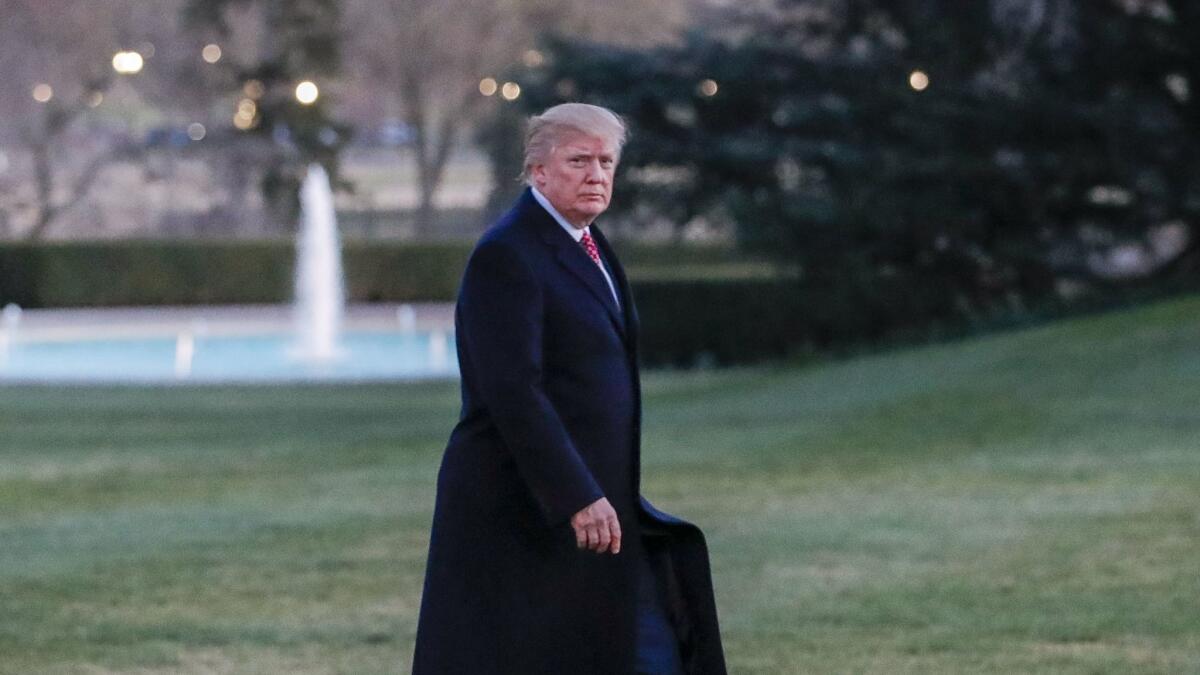Op-Ed: To black Americans, Trump behaves like a classic Southerner — and we feel erased

Talk about whiplash. During the brief era of Donald Trump, black people have been living in trepidation and silent outrage, grappling with the meaning of a man who took office largely on the promise to nullify or reverse whatever America’s first black president, Barack Obama, had accomplished — good, bad or indifferent.
Seeing our historical gains dissolve at the whim of white rage is all too familiar for black folks, which is not to say that the last two months haven’t been a shock. That Trump is not just another white politician but one who is spectacularly unqualified to be president makes the setback that much more racially charged, and ominous.
I keep thinking about what I heard on line at my polling place in November. Two women stood behind me, discussing the election season in low tones and with grim resolve. “That Trump,” one muttered to the other. “He’s the worst kind of cracker.”
She wasn’t reflexively insulting Trump or pushing back against his penchant for nasty name-calling by using a term for white folks that some consider as offensive as the N word. She was recognizing with justifiable dread what Trump and Trumpism would beget: Black people dragged back not just to the struggles of the 1960s — we’ve grown used to that — but all the way back to slavery, back to a racial caste system that tolerated, even encouraged the ugly attitude about blacks (and others) that Trump displays on a regular basis.
The 45th president is unapologetic about his racial ignorance; he disregards anyone he sees as the other.
True, the president is not the product of the unrepentant racist tradition of the South. He is not technically a Dixie holdover who embraces the false romance of the Lost Cause, not exactly the kind of Southerner blacks of certain generations experienced firsthand and conjure when they say “cracker.”
But Trump surely owes a lot to the cracker tradition, which, by the way, has never been confined exclusively to the South. It is, in my estimation, the source of his electoral victory, the thing that propels his persistent popularity among those who see his open antipathy toward people of color and his refusal to be “politically correct” as courageous. His critics and the Democratic Party leadership still stubbornly focus on the economy, on jobs, as the thing that got Trump over. They’re wrong.
The 45th president is unapologetic about his racial ignorance; he disregards anyone he sees as the other. He fairly exudes entitlement, and he embodies the notion of white privilege, which before his victory was finally beginning to be understood by all Americans as morally problematic. That bit of progress, and so much else, has been stalled, perhaps even reversed — all part of the disruption Trump is determined to effect.
For black people, whose activism across generations has been one long, unending fight against not just powerlessness but invisibility, Trump is a vivid, daily unnerving expression of the America we hoped we’d left behind, the America that oppressed us and didn’t think too much about it, the impervious white America that considered inequality not just normal, but necessary, part and parcel of what makes America great.
I thought about this as Black History Month coincided with the administration’s chaotic beginnings. Among the many bizarre moments we witnessed: Trump inadvertently revealing how little he knows about the great abolitionist Frederick Douglass, his cluelessness about the Congressional Black Caucus, and his meeting with a group of historically black college presidents that produced a photo op but no plan for shoring up these institutions.
The president shrugs off everyone’s disbelief at his antics. That’s his modus operandi whenever he’s called on his lies and incomprehension. But I find his fumbling of basic black history, and his nonchalance about it, especially dispiriting. This is black marginalization writ large, just as Obama’s time in Washington was black visibility and possibility writ large, or larger than it had been. Whatever else he did, Obama expanded black presence and our expectations of better times. Trump is hellbent on shrinking them down.
Yet the absence of black voices in this maelstrom is glaring. This nation, in which we have invested so much, is not at all focused on what black people think about the great and terrible shifts in our political fortunes, let alone the arc of racial justice.
Right now, immigrants are having a moral moment, as well they should. Trump’s revised ban on refugees and newcomers, especially Muslims, is still unconscionable. The deportations being carried out by the “unshackled” agents of ICE are downright thuggish. But as we oppose these policies we should recognize that the effort to marginalize and contain immigrants has its roots in ideas of who belongs and who doesn’t, who should assimilate and who shouldn’t, that were fixed in slavery and have been more or less acceptable ever since.
People correctly argue that immigrants belong in America by virtue of their hard work, their sacrifice and especially by their belief in a country built on an ideal of inclusion — immigrants are America. By that measure (and many others), black people are America too. We have always been. That’s a truth that we — including Trump — can ill afford not to see.
Erin Aubry Kaplan is a contributing writer to Opinion. Her latest book is “I Heart Obama.”
Follow the Opinion section on Twitter @latimesopinionand Facebook
More to Read
A cure for the common opinion
Get thought-provoking perspectives with our weekly newsletter.
You may occasionally receive promotional content from the Los Angeles Times.










